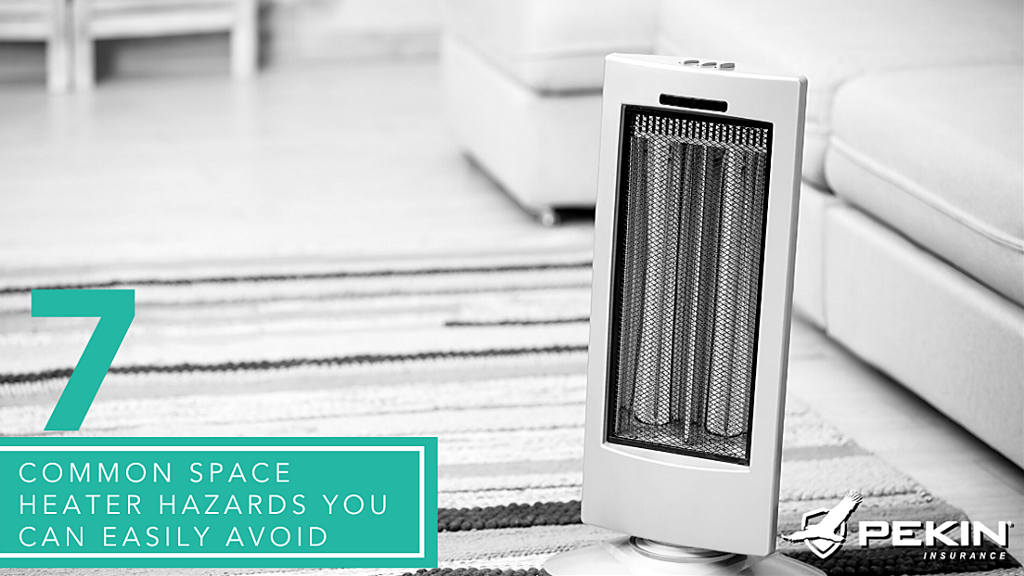7 Common Space Heater Hazards You Can Easily Avoid

Space heaters bring a toasty, campfire feeling to your home. The cost and portability are attractive, too. But when you use space heaters the wrong way, you replace cozy perks with big risks.
The National Fire Protection Association says:
“Space heaters are the type of heating equipment most often involved in home heating fires, figuring in two of every five of these fires and accounting for 86% of associated civilian deaths, 78% of civilian injuries, and 54% of direct property damage.”
The numbers don’t lie! Stay safe and warm by avoiding the most common space heater hazards.
1. Operating Too Close to Flammable Material
Are space heaters dangerous? It depends on how you use them.
They should supplement your furnace. Don’t rely on them as your main source of warmth because some space heaters use exposed heating sources that reach 100 °F.
They need three feet of space around them when they’re hot or in use. Doing this drastically reduces the risk of a fire.
Never set a space heater on carpet or a rug. Use hard floors or a fire-proof surface.
2. Running Your Heater Non-Stop
You could overheat the wiring or circuit when you run a space heater 24/7.
If your space heater uses gas or oil, running it too long could lead to carbon monoxide poisoning. Make sure these units are properly vented and turned off at the right time.
Set a timer, or purchase a unit with a built-in thermostat. This turns the space heater off when the room reaches a specific temperature.
No matter what you do, don’t leave a space heater unattended. Turn it off before you leave the room.
3. Using the Wrong Size
Do space heaters use a lot of electricity? It depends on how big the area you need to warm up is.
According to Sylvane, you should have 10 watts of power for every square foot of floor area in the room you’re heating.
It draws more from electricity or fuel when it’s too small for a room, which creates a bigger fire risk. Likewise, a space heater that’s too large can overheat a room and cause combustion.
4. Ignoring Bad or Broken Cords
Broken or frayed cords can lead to electrical fires. If you notice these issues, reach out to a qualified repair person or replace the space heater.
When you use extension cords and power strips with a space heater, you could overload circuits. Consult a licensed electrician before plugging space heaters in to extension cords and power strips.
5. Poor Placement
Don’t put your space heater in an area where people and pets walk. You don’t want the kids and critters to run into it and get hurt.
The contact could cause the space heater to fall over, so invest in a unit that shuts off automatically when it tips.
6. Running a Heater in Humid Environments
Moisture in your home can cause electrical problems with your space heater. Only use units approved for your bathroom.
Don’t use space heaters for a flooded basement, either. You’d be better served using a dehumidifier or wet-dry vacuum. If the problem is serious, you should reach out to a plumber.
7. Neglecting Maintenance
It’s time for service or replacement if your space heater makes strange noises, gets too hot, or doesn’t get hot enough. Don’t ignore the signs of a failing unit because it could cost you.
A Few More Things You Should Know
Propane, natural gas, and kerosene space heaters are unvented. They produce carbon monoxide, too.
That’s why they’re not meant for regular use in your home. You might want one to keep you warm when you work in your garage. That’s ok, but make sure you keep it ventilated.
No matter which space heater you buy, make sure it meets testing requirements. It should have a label from a testing laboratory like Underwriters Laboratories (UL).
What happens if a fire breaks out at your home? Would you have a plan to take care of the damage?
Contact a local, licensed Pekin Insurance agent to make sure you have the right homeowners coverage.







